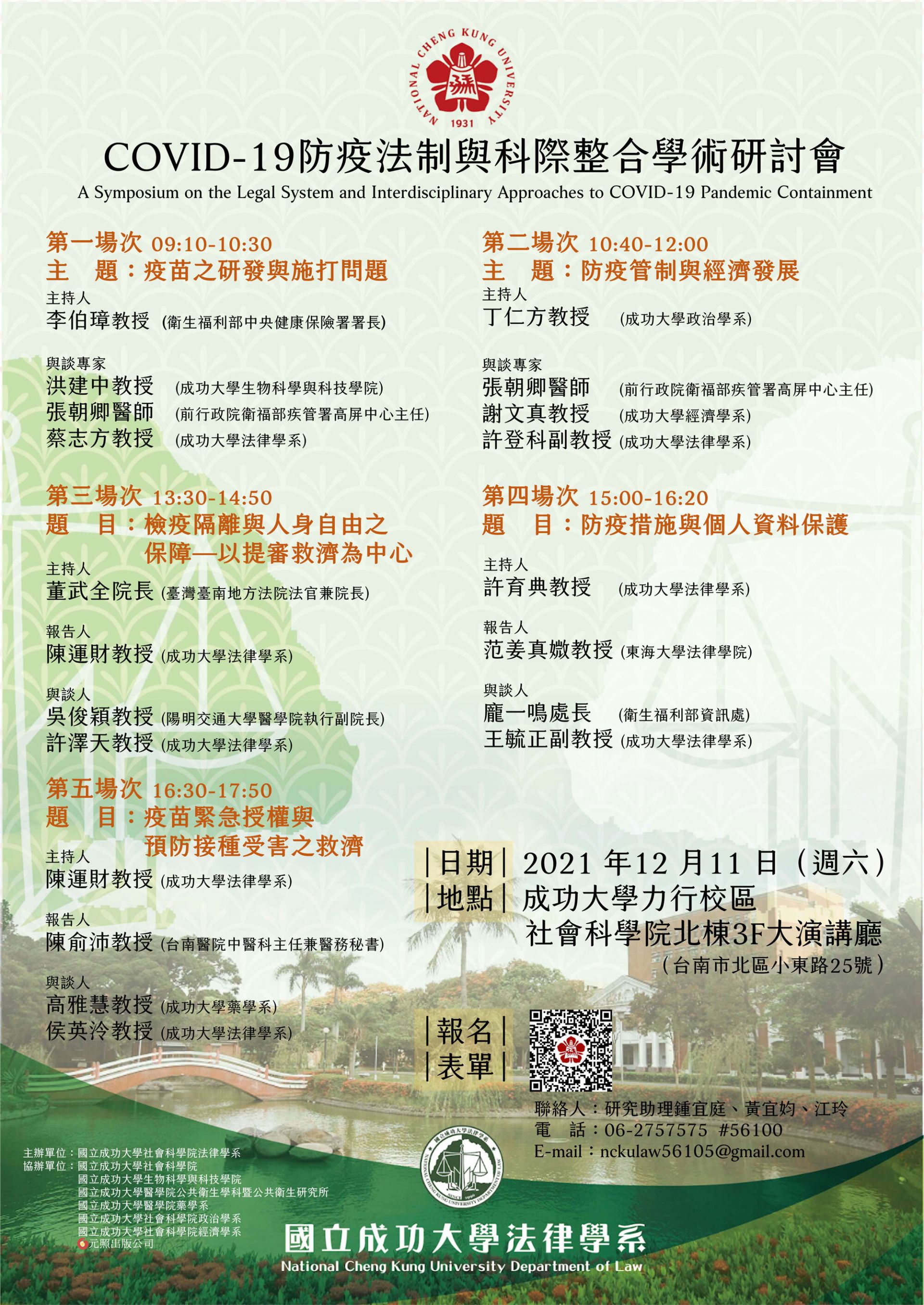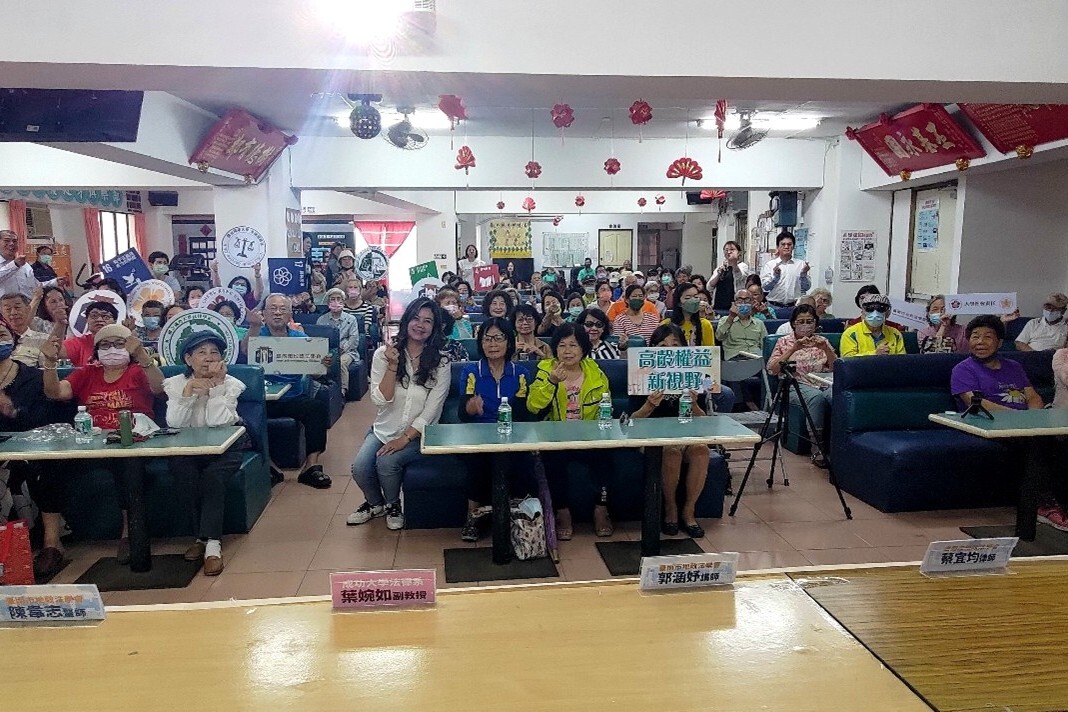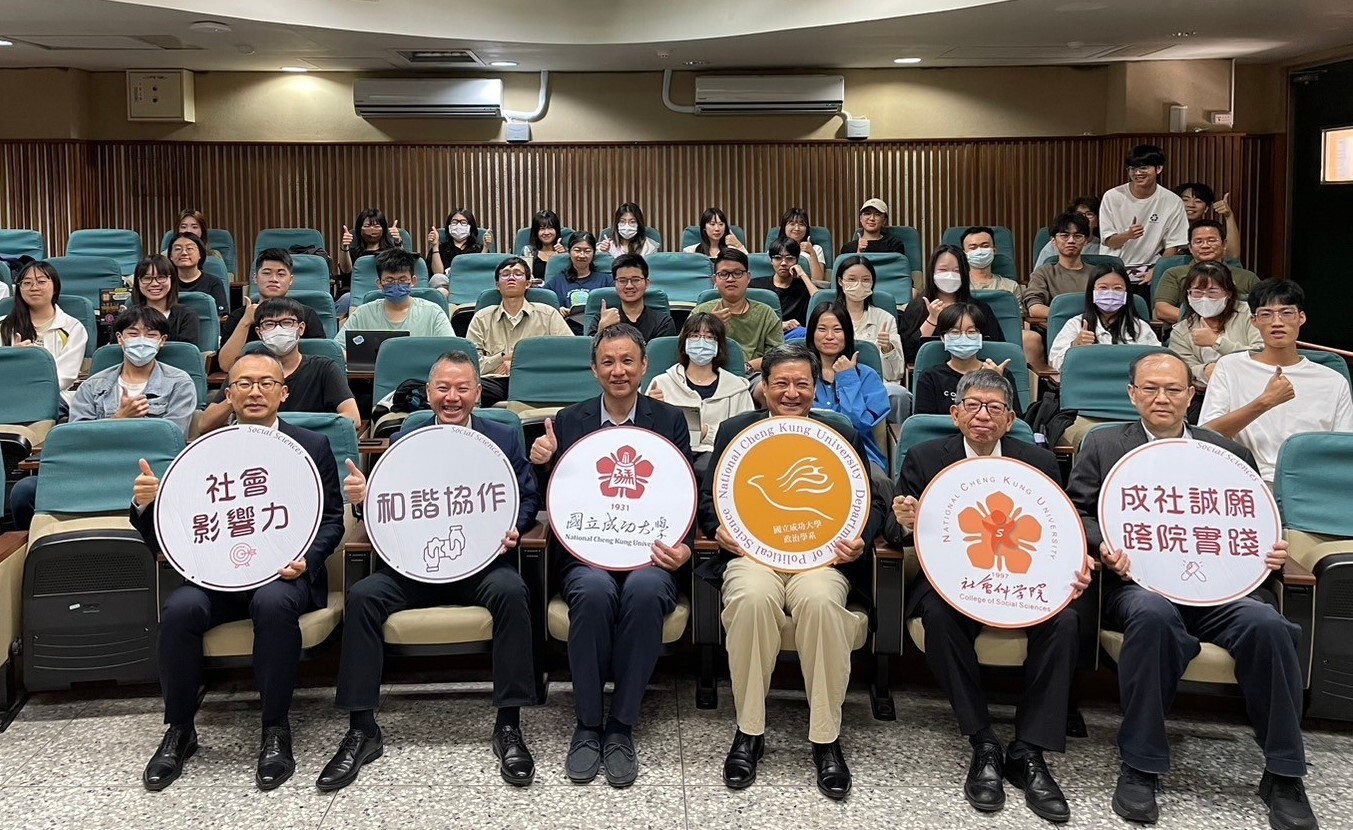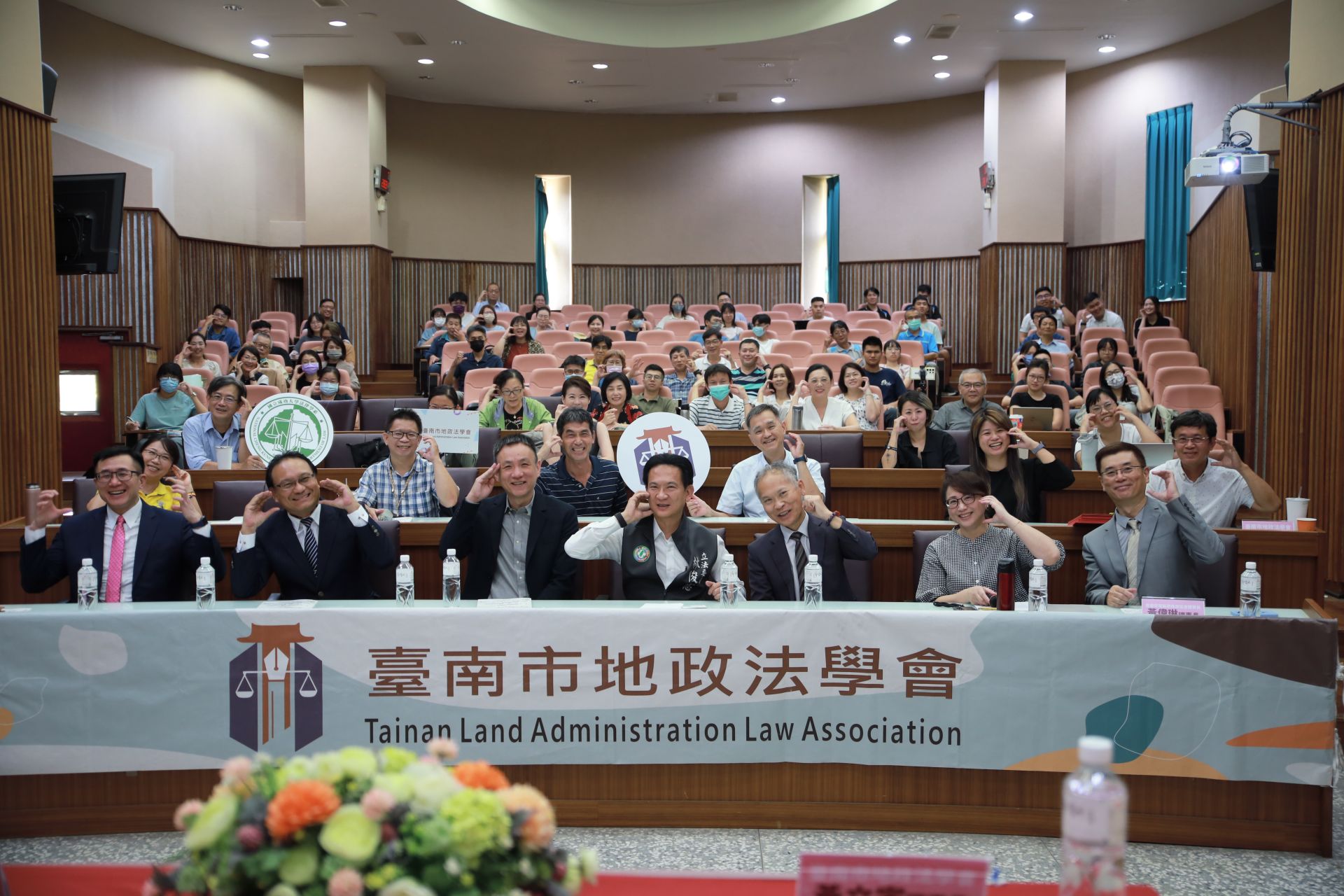SDG16
A Symposium on the Legal System and Interdisciplinary Approaches to COVID-19 Pandemic Containment
Written by Tzu-yueh Hsu; Picture by NCKU Dept. of Law
Since the outbreak of the COVID-19 pandemic, Taiwan has handled the situation in a graceful and efficient manner, and is highly complimented by the international community. However, under strict Covid regulations, the people’s livelihood economy was affected to a certain extent. For this purpose, NCKU Dept. of Law held a “Symposium on the Legal System and Interdisciplinary Approaches to COVID-19 Pandemic Containment”, inviting experts and scholars to review the government’s pandemic prevention measures and vaccine countermeasures; the forum will also focus on coming up with effective policies to resolve disputation and visionary strategies to help the government face the challenges in the post-covid era.
The forum takes place in the 3rd-floor auditorium in the NCKU College of Social Sciences Building. The topics “Vaccine Research and Development with authorization issues”, “Epidemic control and economic development”, “Quarantine and protection of personal freedom”, “Epidemic prevention and personal data protection”, and “Issues of Emergency Authorization of Vaccines and Relief” were explored through 2 roundtable forums and 3 seminars.
Director General of National Health Insurance Administration of the Ministry of Health and Welfare Po-chang Lee M.D., M.T.L hosted the first roundtable forum “Vaccine Research and Development with authorization issues”; along with NCKU DBBS Professor Jan-Jong Hung, former head of Kaohsiung-Pingtung Regional Center of the Ministry of Health and Welfare Ammon Chang, NCKU Law Professor Chih-fang Tsai, he discussed certain issues such as the review process for the emergency authorization, the sequence of vaccination, and the trade-off between increasing coverage of the first dose or completing the second dose.
The second roundtable forum “Epidemic control and economic development” was hosted by NCKU Political Science Professor Jen-fang Ting. NCKU Economics Professor Wen-Jen Hsieh, NCKU Law Professor Teng-ko Hsu and Ammon Chang were the expert consultants in this session, and they talked about how epidemic prevention measures can impact people’s livelihood, trade, and other economic activities.
The 3 seminars in the afternoon were focused on discussions between respective topics. “Quarantine and protection of personal freedom” was hosted by the President of Taiwan Tainan District Court, Wuchuan Tung. NCKU Law professor Yun-tsai Chen delivered a report titled “Quarantine and protection of personal freedom - focusing on arraignment relief”, vice chairman of NYCU Med School Chun-ying Wu and NCKU Law professor Tze-Tien Hsu were both panelists in this session, and together they discussed the legitimacy of the government’s quarantine measures and controversy surrounding related reliefs.
“Epidemic prevention and personal data protection” was hosted by NCKU Law professor Yue-Dian Hsu, with THU Law professor Chen-mei Fan Chiang delivering the talk. Head of Dept. of Information Management of the Ministry of Health and Welfare Yi-ming Pang and NCKU Law professor Yu-cheng Wand were the panelists in the session, and together they talked about the government’s measures to track Covid footprints, the pandemic tracing system and privacy, how to appropriately make pandemic investigation data public and how to strike the balance between public health and personal privacy.
“Issues of Emergency Authorization of Vaccines and Relief” was hosted by Yun-tsai Chen, with Prof. Yu-pei Chen from Tainan Hospital delivering the report. NCKU Pharmacy professor Yea-huei Kao and NCKU Law professor Ing-ling Hou were the panelists in this session, and they discussed the independence, professionalism, and transparency in the review process of the vaccine authorization. They also talked about the process of relief for those who suffer from health damage from the vaccination.
Since early 2020, Covid-19 has deeply impacted the world’s livelihood, politics, and education. In comparison with other nations in the world, Taiwan prevented Covid from mass spreading with effective border control, mask regulations and tracking systems, hence gaining a good reputation in the international society. However, because of strict regulations regarding the pandemic, economic activities and people’s rights were restricted to a certain level, and recently the vaccination sequence caused some debate as well.
NCKU fulfills its social responsibility by examining the effects of the epidemic prevention measures on economics, society, and education through facts and science, discussing effective measures; it also provides a reference to the government for determining policies in the post-Covid era.
On Dec 11th from 8:30am to 17:50 pm, the “Symposium on the Legal System and Interdisciplinary Approaches to COVID-19 Pandemic Containment” had taken place in the 3rd floor auditorium in NCKU College of Social Sciences (Li-Hsing campus). It gathered together faculty across different departments as well as professionals from a wide range of fields to discuss this matter.
Since the outbreak of the COVID-19 pandemic, Taiwan has handled the situation in a graceful and efficient manner, and is highly complimented by the international community. However, under strict Covid regulations, the people’s livelihood economy was affected to a certain extent. For this purpose, NCKU Dept. of Law held a “Symposium on the Legal System and Interdisciplinary Approaches to COVID-19 Pandemic Containment”, inviting experts and scholars to review the government’s pandemic prevention measures and vaccine countermeasures; the forum will also focus on coming up with effective policies to resolve disputation and visionary strategies to help the government face the challenges in the post-covid era.
The forum takes place in the 3rd-floor auditorium in the NCKU College of Social Sciences Building. The topics “Vaccine Research and Development with authorization issues”, “Epidemic control and economic development”, “Quarantine and protection of personal freedom”, “Epidemic prevention and personal data protection”, and “Issues of Emergency Authorization of Vaccines and Relief” were explored through 2 roundtable forums and 3 seminars.
Director General of National Health Insurance Administration of the Ministry of Health and Welfare Po-chang Lee M.D., M.T.L hosted the first roundtable forum “Vaccine Research and Development with authorization issues”; along with NCKU DBBS Professor Jan-Jong Hung, former head of Kaohsiung-Pingtung Regional Center of the Ministry of Health and Welfare Ammon Chang, NCKU Law Professor Chih-fang Tsai, he discussed certain issues such as the review process for the emergency authorization, the sequence of vaccination, and the trade-off between increasing coverage of the first dose or completing the second dose.
The second roundtable forum “Epidemic control and economic development” was hosted by NCKU Political Science Professor Jen-fang Ting. NCKU Economics Professor Wen-Jen Hsieh, NCKU Law Professor Teng-ko Hsu and Ammon Chang were the expert consultants in this session, and they talked about how epidemic prevention measures can impact people’s livelihood, trade, and other economic activities.
The 3 seminars in the afternoon were focused on discussions between respective topics. “Quarantine and protection of personal freedom” was hosted by the President of Taiwan Tainan District Court, Wuchuan Tung. NCKU Law professor Yun-tsai Chen delivered a report titled “Quarantine and protection of personal freedom - focusing on arraignment relief”, vice chairman of NYCU Med School Chun-ying Wu and NCKU Law professor Tze-Tien Hsu were both panelists in this session, and together they discussed the legitimacy of the government’s quarantine measures and controversy surrounding related reliefs.
“Epidemic prevention and personal data protection” was hosted by NCKU Law professor Yue-Dian Hsu, with THU Law professor Chen-mei Fan Chiang delivering the talk. Head of Dept. of Information Management of the Ministry of Health and Welfare Yi-ming Pang and NCKU Law professor Yu-cheng Wand were the panelists in the session, and together they talked about the government’s measures to track Covid footprints, the pandemic tracing system and privacy, how to appropriately make pandemic investigation data public and how to strike the balance between public health and personal privacy.
“Issues of Emergency Authorization of Vaccines and Relief” was hosted by Yun-tsai Chen, with Prof. Yu-pei Chen from Tainan Hospital delivering the report. NCKU Pharmacy professor Yea-huei Kao and NCKU Law professor Ing-ling Hou were the panelists in this session, and they discussed the independence, professionalism, and transparency in the review process of the vaccine authorization. They also talked about the process of relief for those who suffer from health damage from the vaccination.
Since early 2020, Covid-19 has deeply impacted the world’s livelihood, politics, and education. In comparison with other nations in the world, Taiwan prevented Covid from mass spreading with effective border control, mask regulations and tracking systems, hence gaining a good reputation in the international society. However, because of strict regulations regarding the pandemic, economic activities and people’s rights were restricted to a certain level, and recently the vaccination sequence caused some debate as well.
NCKU fulfills its social responsibility by examining the effects of the epidemic prevention measures on economics, society, and education through facts and science, discussing effective measures; it also provides a reference to the government for determining policies in the post-Covid era.
On Dec 11th from 8:30am to 17:50 pm, the “Symposium on the Legal System and Interdisciplinary Approaches to COVID-19 Pandemic Containment” had taken place in the 3rd floor auditorium in NCKU College of Social Sciences (Li-Hsing campus). It gathered together faculty across different departments as well as professionals from a wide range of fields to discuss this matter.

The department of Law, NCKU held a Symposium on the Legal System and Interdisciplinary Approaches to COVID-19 Pandemic Containment

SDG16NCKU Law Department Promotes Legal Education on Elder Rights in the Community – All Are Welcome to Join
View more
SDG16NCKU College of Social Sciences Forum: Analysis of Indo-Pacific Strategic Direction Following the U.S. Presidential Election
View more



















